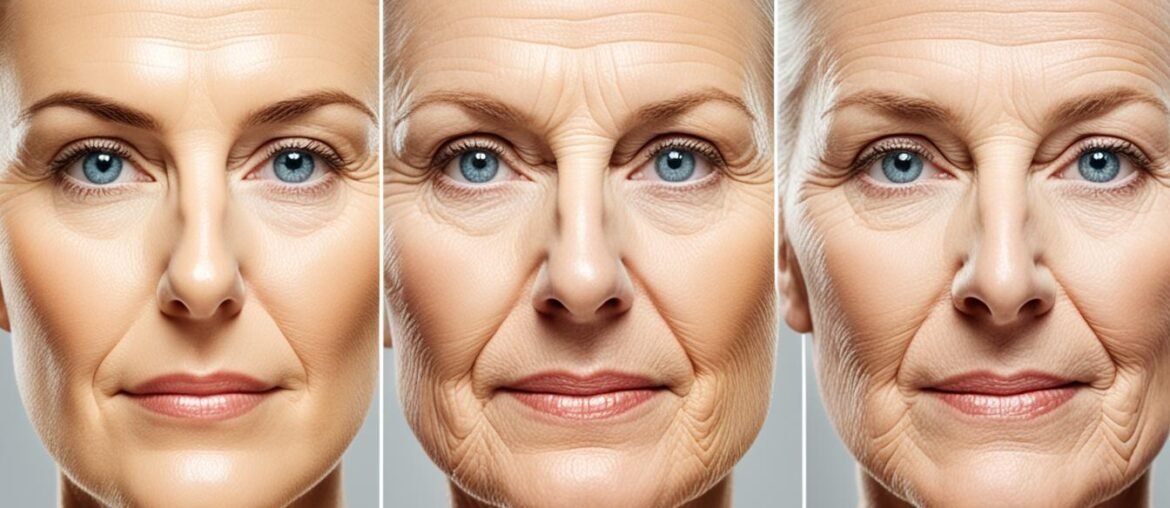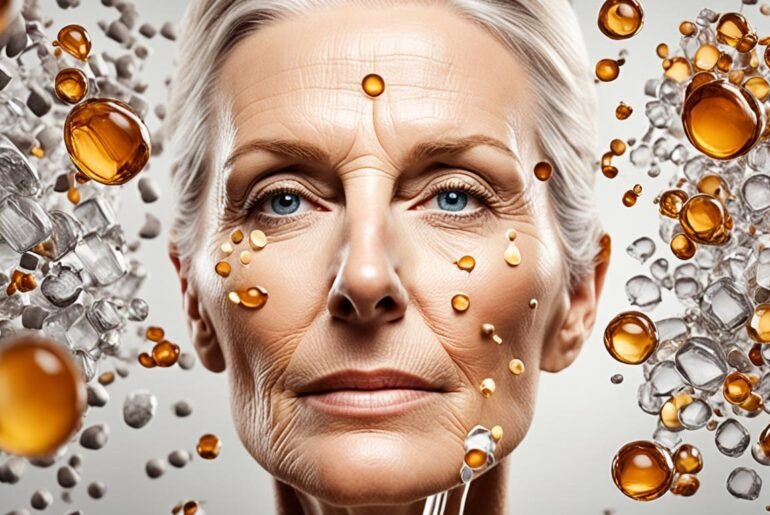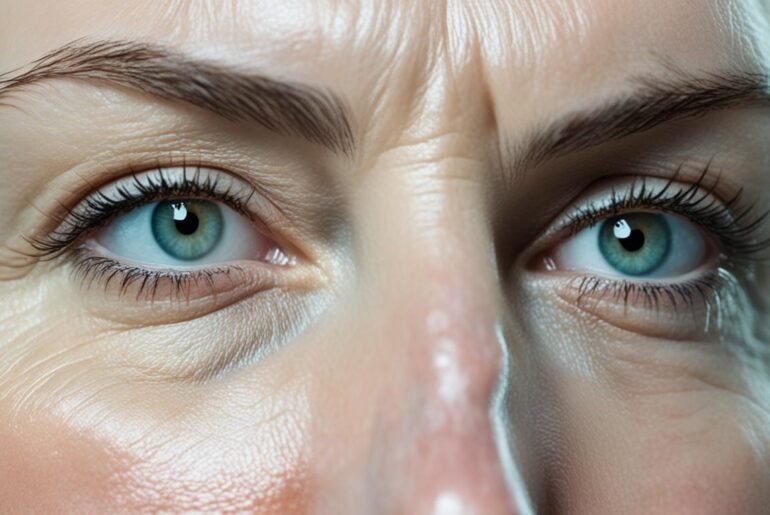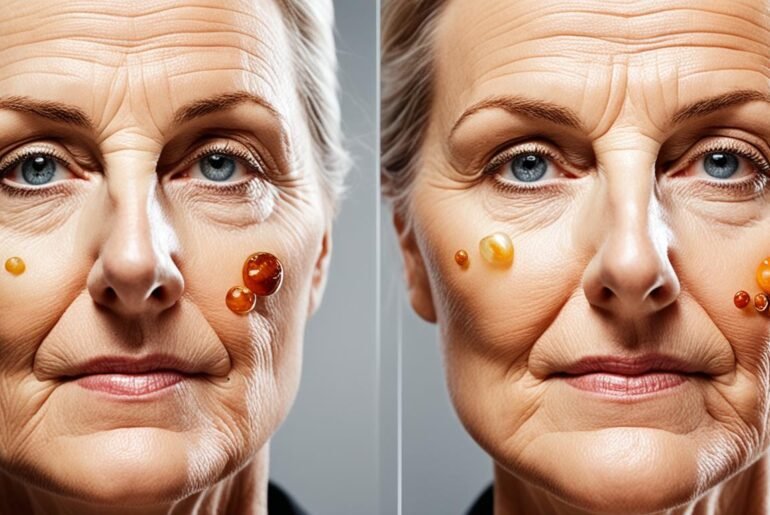Did you know that excessive alcohol consumption can accelerate the aging process of your skin? It’s true! Studies have shown that alcohol not only dehydrates the skin but also contributes to inflammation and damages collagen levels, resulting in wrinkles, decreased elasticity, and other visible signs of premature aging.
- Excessive alcohol consumption can lead to premature aging of the skin.
- Alcohol dehydrates the skin, causing dryness and loss of elasticity.
- Alcohol consumption inflames the skin, resulting in redness and puffiness.
- Alcohol damages collagen levels, leading to the formation of wrinkles and fine lines.
- Regular alcohol consumption can exacerbate existing skin conditions and impair the skin’s ability to heal and regenerate.
The Effects of Alcohol on the Skin
Alcohol consumption can have several detrimental effects on the skin. It dehydrates the skin, leading to dryness and a lack of elasticity. It also causes inflammation, resulting in redness and puffiness. Furthermore, alcohol damages the collagen levels in the skin, which leads to the formation of wrinkles and fine lines. These effects are more pronounced in individuals who consume alcohol heavily and over a long period of time. Additionally, alcohol can cause skin conditions like acne and rosacea, and it impairs the skin’s ability to heal and regenerate.
“Alcohol dehydrates the skin, causing dryness and a lack of elasticity, while also damaging collagen levels, leading to wrinkles and fine lines.”
The Impact of Alcohol on Skin Elasticity
Alcohol consumption negatively affects the skin’s elasticity, leading to a loss of firmness and sagging. It dehydrates the skin, impairing its ability to retain moisture and maintain its natural elasticity. This results in a dull and tired appearance, with the skin lacking plumpness and resilience. Additionally, alcohol-induced inflammation further compromises skin elasticity, contributing to redness, puffiness, and an uneven texture.
The Role of Inflammation in Alcohol-Induced Skin Damage
Alcohol consumption triggers inflammation in the skin, leading to various skin issues. The dilation of blood vessels caused by alcohol results in facial redness and a flushed complexion. Persistent inflammation can damage the skin’s barrier function, making it more susceptible to environmental aggressors and moisture loss. This can exacerbate existing skin conditions like acne and rosacea, and hinder the skin’s ability to repair and regenerate.
The Relationship Between Alcohol and Wrinkles
Excessive alcohol consumption accelerates the formation of wrinkles and fine lines. Alcohol depletes collagen levels in the skin, compromising its structural integrity. Collagen, a vital protein responsible for maintaining skin elasticity and firmness, is essential in preventing the onset of wrinkles. Alcohol-induced collagen damage leads to a breakdown of the skin’s supportive structure, resulting in the formation of deepening lines and wrinkles.
Alcohol and Skin Conditions
Alcohol consumption can aggravate and contribute to various skin conditions. Acne, a common skin issue characterized by clogged pores and inflammation, can worsen due to increased oil production and inflammation caused by alcohol. Furthermore, alcohol can trigger flare-ups in individuals with rosacea, a chronic skin condition characterized by facial redness and visible blood vessels. These skin conditions can further delay the skin’s healing process, leading to prolonged inflammation and a compromised skin barrier.
It’s important to note that while moderate alcohol consumption may not cause significant harm to the skin, excessive and chronic alcohol use can have profound negative effects. It’s crucial to prioritize moderation and balance in alcohol consumption to support overall skin health and prevent premature aging.
The Impact of Alcohol on Facial Aging
Research has shown that alcohol consumption significantly impacts facial aging. Heavy alcohol use is associated with increased severity of facial lines, including forehead lines, crow’s feet, glabellar lines, and nasolabial folds. It also contributes to volume loss in the midface and oral commissures. Additionally, alcohol consumption can lead to the dilation of facial blood vessels, resulting in visible blood vessels on the skin.
These effects are more pronounced in individuals who consume alcohol at high levels and for a prolonged period of time.
Understanding the impact of alcohol on facial aging is crucial for those concerned about maintaining youthful and healthy skin. The visible signs of facial aging, such as fine lines, wrinkles, and volume loss, are influenced by various factors, including lifestyle choices and environmental factors.
The Role of Alcohol in Facial Aging
Alcohol consumption affects the skin in several ways, contributing to the development of facial lines and volume-related aging. Here are some key mechanisms through which alcohol impacts facial aging:
- Dermatological Effects: Alcohol dehydrates the skin, resulting in decreased skin elasticity and the formation of fine lines and wrinkles. It also disrupts the production of collagen and elastin, leading to the loss of facial volume.
- Vascular Effects: Alcohol causes the dilation of blood vessels in the face, leading to the appearance of visible blood vessels, redness, and flushing.
- Inflammatory Effects: Alcohol consumption promotes inflammation in the body, which can manifest as facial redness and puffiness. Chronic inflammation also contributes to collagen breakdown and accelerates the aging process.
By understanding these mechanisms, individuals can make informed choices about their alcohol consumption in order to minimize the impact on facial aging.
Preventing and Treating Alcohol-Related Facial Aging
To prevent and treat alcohol-related facial aging, it is important to adopt healthy lifestyle habits and skincare practices:
- Limit Alcohol Consumption: Moderating alcohol intake or abstaining from heavy drinking can significantly reduce the risk of facial aging caused by alcohol.
- Maintain a Healthy Skincare Regimen: Consistently cleansing, moisturizing, and protecting the skin from sun damage can help minimize the effects of alcohol on facial aging.
- Stay Hydrated: Drinking plenty of water helps counteract the dehydrating effects of alcohol and keeps the skin hydrated and plump.
- Eat a Balanced Diet: A diet rich in antioxidants, vitamins, and minerals supports overall skin health and can help mitigate the effects of alcohol on facial aging.
- Consult with a Dermatologist: Seeking professional advice from a dermatologist can provide personalized recommendations for preventing and treating alcohol-related facial aging.
By taking proactive steps to minimize alcohol-related facial aging, individuals can maintain a youthful and healthy complexion for years to come.
| Facial Aging Effects | Description |
|---|---|
| Forehead lines | Horizontal lines that appear on the forehead due to repetitive facial movements and decreased skin elasticity. |
| Crow’s feet | Small wrinkles that radiate from the outer corners of the eyes, often caused by squinting and smiling. |
| Glabellar lines | Vertical lines that form between the eyebrows, commonly known as frown lines or “11” lines. |
| Nasolabial folds | Deep lines that extend from the sides of the nose to the corners of the mouth, resulting from volume loss and sagging skin. |
Alcohol and Skin Dehydration
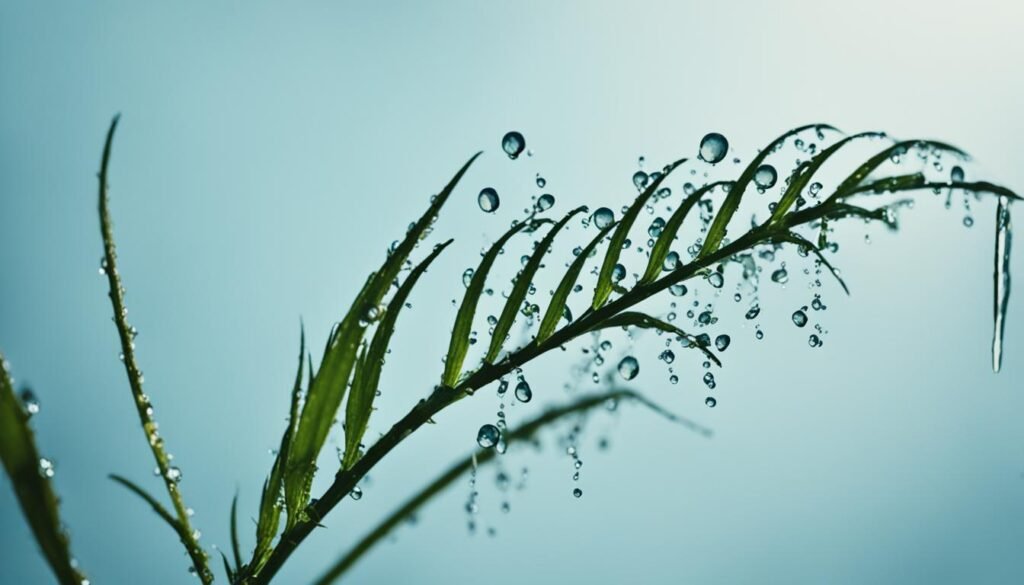
One of the main effects of alcohol consumption on the skin is dehydration. Alcohol acts as a diuretic, increasing urine production and resulting in fluid loss from the body. This can lead to dry and dehydrated skin, making it more susceptible to the formation of wrinkles and fine lines. Alcohol not only depletes the skin’s moisture levels but also impairs its ability to retain moisture, exacerbating dryness and compromising skin health.
When alcohol is consumed in excess, the body may struggle to replenish the lost fluids adequately, leading to persistent skin dryness and dehydration. These effects are particularly pronounced in individuals who regularly consume alcohol at high levels or over a prolonged period of time.
“Alcohol dehydrates the body, leading to dry and dehydrated skin. This can result in premature aging and the development of wrinkles and fine lines.”
In order to understand the extent of alcohol-induced skin dehydration, let’s take a look at the following table:
| Alcohol Consumption | Skin Dehydration Level |
|---|---|
| Minimal to Moderate | Some dryness and occasional dehydration |
| Heavy and Prolonged | Severe dryness and chronic dehydration |
Note: The table presents a general overview of the relationship between alcohol consumption and skin dehydration. The severity of skin dehydration may vary among individuals based on factors such as genetics, overall health, and hydration habits.
To address the issue of alcohol-related skin dehydration, it is essential to maintain a balanced approach to alcohol consumption. Staying well-hydrated by drinking plenty of water and using moisturizing skincare products can help mitigate the detrimental effects of alcohol on the skin. Additionally, practicing moderation and being mindful of alcohol intake can promote overall skin health and prevent the development of dehydration-related skin issues.
The Importance of Hydration
In order to keep the skin healthy and hydrated, it is crucial to prioritize hydration. Drinking an adequate amount of water throughout the day helps maintain the skin’s moisture balance and supports its natural functions. Additionally, incorporating hydrating skincare products into the daily routine can further nourish and replenish the skin’s hydration levels. Proper hydration not only prevents skin dryness, but it also promotes a plump, supple complexion and helps delay the onset of visible signs of aging.
Alcohol-Induced Inflammation and Skin Redness
Alcohol consumption can trigger inflammation in the skin, leading to noticeable redness and a flushed complexion. When you consume alcohol, it acts as a vasodilator, expanding blood vessels throughout your body, including those in your skin. This expansion can cause a histamine reaction in the skin, resulting in redness and flushing.
Regular and excessive alcohol consumption can lead to persistent facial redness that is challenging to reverse. This effect is particularly prominent in individuals who consume alcohol heavily and over long periods of time.
In addition to the immediate redness caused by alcohol, there is evidence to suggest that the long-term inflammation induced by alcohol can have lasting effects on the skin’s health and appearance. Chronic alcohol-induced skin inflammation may contribute to premature aging and other skin issues.
It’s important to note that the severity of alcohol-induced inflammation and redness can vary among individuals. Factors such as genetics, overall skin health, and lifestyle choices can influence how individuals respond to alcohol’s effects on the skin.
If you are concerned about addressing alcohol-induced inflammation and skin redness, it’s essential to take steps to reduce or moderate your alcohol consumption. Additionally, implementing a skincare routine that includes products targeting inflammation and redness, such as those containing soothing ingredients like aloe vera or green tea extract, may help alleviate these issues.
| Effects of Alcohol Consumption on the Skin | Severity |
|---|---|
| Alcohol-Induced Inflammation and Skin Redness | Varies among individuals, more pronounced in heavy and long-term drinkers |
| Dehydration and Dryness | Common in individuals who consume alcohol excessively |
| Collagen Depletion and Wrinkles | More likely in heavy and long-term drinkers |
| Worsening of Skin Conditions | Can exacerbate acne and rosacea symptoms |
Alcohol’s Impact on Collagen Levels and Wrinkles
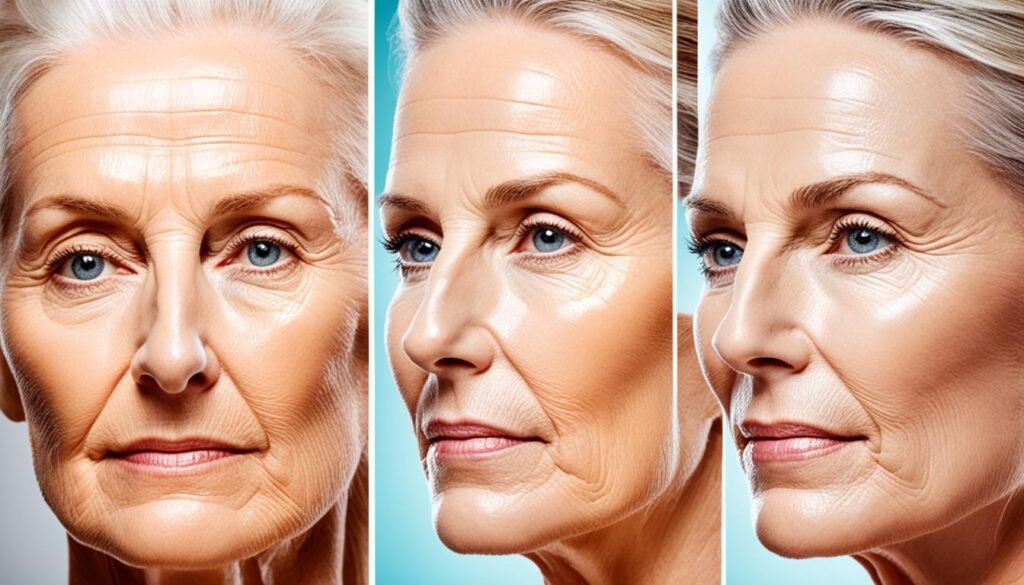
Alcohol consumption can have detrimental effects on the levels and quality of collagen in the skin, leading to the formation of wrinkles and fine lines. Collagen is a crucial protein that maintains the skin’s structure and elasticity, providing a youthful and plump appearance.
When alcohol is consumed, it interferes with the synthesis of collagen, disrupting its production and impairing the skin’s ability to repair and regenerate. Additionally, alcohol increases the production of free radicals, which are harmful molecules that can damage collagen fibers.
The combination of reduced collagen production and increased collagen damage results in the breakdown of the skin’s supportive structure, leading to the formation of wrinkles, fine lines, and sagging skin. These effects are more pronounced in individuals who consume alcohol heavily over a prolonged period of time.
To visualize the impact of alcohol on collagen levels and wrinkles, refer to the table below:
| Alcohol Consumption Level | Collagen Levels | Wrinkles |
|---|---|---|
| Light/moderate | Minimal impact | Few or minimal |
| Heavy/chronic | Significantly reduced | Increased severity |
Note: The table above showcases the general trends and impacts of alcohol consumption on collagen levels and wrinkles. Results may vary based on individual factors such as genetics, overall skin health, and other lifestyle habits.
It is important to protect and preserve collagen levels in the skin for maintaining a youthful appearance. Limiting alcohol consumption and adopting a healthy lifestyle can help support collagen synthesis and maintain skin elasticity.
Alcohol and Skin Conditions
Alcohol consumption can have a detrimental impact on the skin, exacerbating existing conditions and contributing to the development of new ones. Let’s take a closer look at the effects it has on two common skin conditions: acne and rosacea.
The Link Between Alcohol and Acne
Acne is a skin condition characterized by the presence of pimples, blackheads, and whiteheads. While multiple factors contribute to its development, alcohol consumption can worsen acne symptoms and impede the healing process.
“Alcohol increases inflammation and oil production in the skin, both of which can exacerbate existing acne or contribute to the formation of new breakouts.”
When we consume alcohol, it triggers an inflammatory response in the body, leading to increased redness, swelling, and irritation of existing acne lesions. Furthermore, alcohol stimulates the production of sebum, the natural oil that lubricates the skin. Excess sebum can clog pores, leading to the formation of more pimples and blackheads.
In addition to its direct impact on acne, alcohol can also interfere with the immune system’s ability to fight off bacteria, making the skin more susceptible to infections and delaying the healing process.
Alcohol and Rosacea Flare-ups
Rosacea is a chronic skin condition characterized by facial redness, visible blood vessels, and sometimes small, pus-filled bumps. While the exact cause of rosacea is unknown, alcohol consumption is recognized as a common trigger for rosacea flare-ups.
“Alcohol can cause facial flushing and dilation of blood vessels, intensifying the redness and visibility of blood vessels on the skin.”
In individuals with rosacea, alcohol acts as a vasodilator, causing blood vessels in the face to widen. This leads to increased blood flow and visible redness. The dilation of blood vessels can also result in the appearance of small, broken blood vessels on the skin’s surface.
Moreover, alcohol-induced inflammation can further exacerbate the symptoms of rosacea, including the formation of pus-filled bumps and increased sensitivity.
It is important to note that while alcohol can worsen these skin conditions, it may not directly cause them. However, minimizing alcohol consumption can help manage and prevent exacerbation of symptoms.
| Alcohol and Skin Conditions | Effects |
|---|---|
| Acne |
|
| Rosacea |
|
Alcohol’s Effects on Sleep and Skin Health
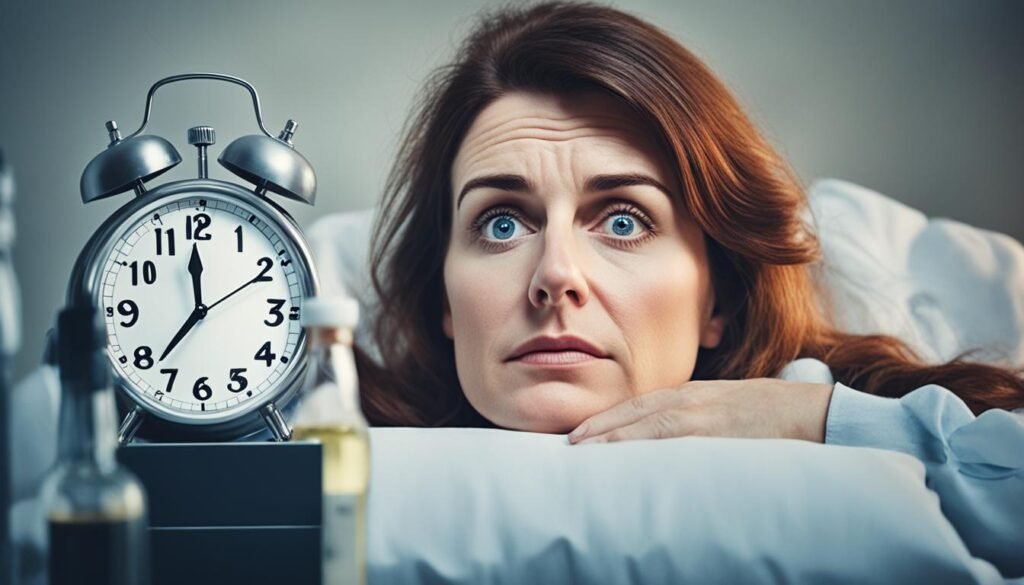
Excessive alcohol consumption can have detrimental effects on both sleep patterns and skin health. Alcohol interferes with the quality and duration of sleep, leading to inadequate rest and poor sleep quality. This disruption in sleep can result in a tired and aged appearance, including the appearance of under-eye bags and a dull complexion.
The impact of alcohol on sleep is significant. While alcohol may initially induce drowsiness, it disrupts the natural sleep cycle and prevents deep, restorative sleep. As a result, individuals who consume alcohol before bed may experience fragmented sleep, frequent awakenings throughout the night, and overall poor sleep quality.
Alcohol-induced poor sleep can lead to a tired and aged appearance, impacting the overall health and appearance of the skin.
Lack of quality sleep has a direct effect on the skin’s health and appearance. When sleep is compromised, the skin’s ability to repair and regenerate is impaired. This can contribute to premature aging, as the skin is unable to effectively heal and maintain its youthful appearance.
To illustrate the impact of alcohol on sleep and skin health, consider the following:
| Effects of Alcohol on Sleep | Effects of Poor Sleep on Skin Health |
|---|---|
| Fragmented and restless sleep | Impaired skin repair and regeneration |
| Frequent awakenings throughout the night | Premature aging and increased wrinkles |
| Disrupted sleep cycle | Dull complexion and uneven skin tone |
It is important to prioritize quality sleep for optimal skin health. Limiting alcohol consumption, especially before bedtime, can help improve sleep patterns and promote overall skin wellness.
Other Aging Effects of Alcohol Consumption
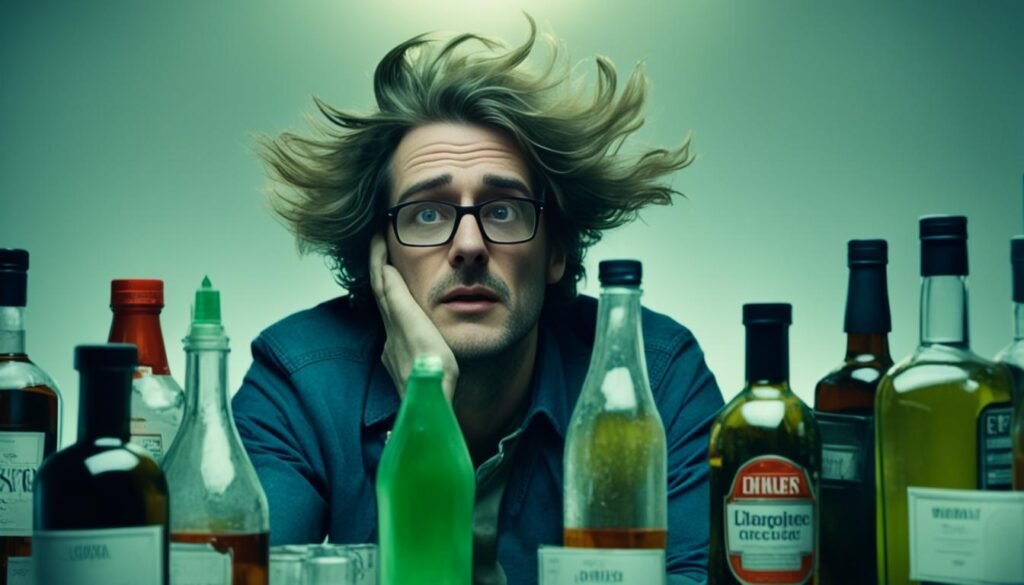
In addition to its effects on the skin, alcohol consumption can have various other aging effects on the body. Heavy drinking can lead to weight gain, as alcoholic beverages are high in empty calories and can increase appetite. The excess calories from alcohol can contribute to an increase in body weight, particularly around the abdominal area.
Furthermore, alcohol consumption has been linked to hair loss. It is believed that nutritional deficiencies and hormonal imbalances caused by heavy drinking may contribute to hair thinning and loss.
Poor hygiene is also prevalent among individuals who consume alcohol excessively. Neglecting personal hygiene routines can result in various skin issues, such as acne, infections, and cavities in teeth due to improper oral care.
Lastly, alcohol can affect body odor. Increased sweating and elimination of alcohol from the body can cause an unpleasant odor that is more noticeable in heavy drinkers.
It is important to consider these additional aging effects of alcohol consumption in addition to the well-known detrimental effects on the skin. Moderating alcohol intake and focusing on overall health and hygiene can help mitigate these aging effects.
Conclusion
In conclusion, the impact of alcohol consumption on skin health and the aging process cannot be ignored. Excessive alcohol intake can lead to dehydration, inflammation, and collagen depletion, resulting in the formation of wrinkles, loss of elasticity, and other visible signs of premature aging. It can also worsen existing skin conditions and hinder the skin’s natural healing ability.
Furthermore, alcohol disrupts sleep patterns, leading to a tired and aged appearance. Additionally, it can contribute to weight gain, hair loss, poor hygiene, and unpleasant body odor. To maintain optimal skin health and delay the aging process, it is crucial to moderate alcohol consumption and prioritize overall wellness.
By making conscious choices and adopting a balanced lifestyle, individuals can safeguard their skin from the detrimental effects of alcohol and promote long-lasting skin health and vitality.
FAQ
What are the effects of alcohol on the skin?
Alcohol consumption can cause dehydration, inflammation, and collagen depletion in the skin, leading to wrinkles, loss of elasticity, and other signs of aging.
How does alcohol impact facial aging?
Heavy alcohol use is associated with increased severity of facial lines, volume loss in the midface, and the dilation of facial blood vessels, resulting in visible signs of aging.
Does alcohol lead to skin dehydration?
Yes, alcohol is a diuretic and can cause fluid loss in the body, leading to dry and dehydrated skin, making it more prone to wrinkles and fine lines.
Can alcohol cause inflammation and redness in the skin?
Yes, alcohol is a vasodilator and can cause a histamine reaction in the skin, resulting in redness and a flushed complexion.
How does alcohol affect collagen levels and wrinkles?
Alcohol interferes with collagen synthesis and increases the production of free radicals, leading to the formation of wrinkles, fine lines, and sagging skin.
Can alcohol worsen skin conditions?
Yes, alcohol can exacerbate existing skin conditions like acne and rosacea and impair the skin’s natural ability to heal and regenerate.
What are the effects of alcohol on sleep and skin health?
Alcohol disrupts sleep patterns, leading to inadequate rest and poor sleep quality, which can result in a tired and aged appearance.
Does alcohol have other aging effects on the body?
Yes, alcohol consumption can contribute to weight gain, hair loss, poor hygiene, and body odor, which all contribute to the aging process.
How does alcohol consumption impact overall skin health?
Excessive alcohol consumption can have significant negative effects on the skin, contributing to premature aging and skin damage.
What should I do to maintain skin health and delay the aging process?
It is important to moderate alcohol consumption and prioritize overall wellness, including a healthy diet, hydration, proper skincare, and adequate sleep.

